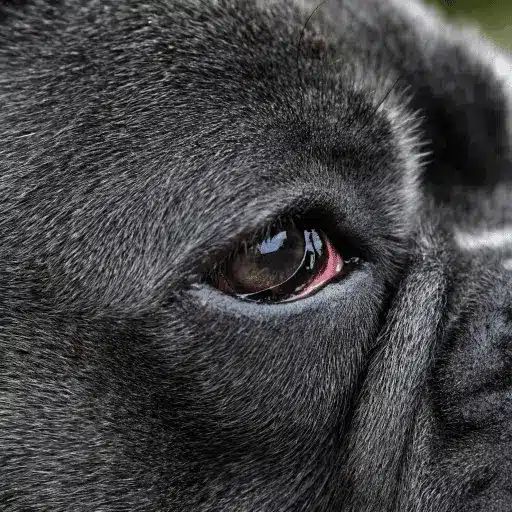What is Cherry eye in Dogs in Birmingham
"Cherry eye in dogs" describes the third eyelid gland's protrusion, or burst, outward. Many mammals, including dogs in Birmingham, have a third eyelid on their lower eyelid that is called the nictitating membrane. More protection for the eye is afforded by the third eyelid, especially while hunting or conflict. Furthermore, a significant portion of the tear film that protects the eye is produced by a special gland located in the third eyelid.
Dogs that have cherry eye have a red, swollen mass around their nose or muzzle on their lower eyelid that resembles a cherry. Cherry eyes in dogs in Birmingham can range in size from little and only present rarely to large and covering a significant portion of the cornea. Your veterinarian should be notified of any symptoms as soon as possible.

What Causes Cherry Eye in Dogs in Birmingham?
The gland that produces the third eyelid is normally attached to the lower inner rim of the eye by a fibrous band. It's thought that in certain dog breeds, this relationship is weak, which increases the gland's prolapse risk. The most prevalent dog breeds in Birmingham that suffer from cherry eye are the English Bulldog, French Bulldog, Cocker Spaniel, Beagle, Bloodhound, Lhasa Apso, Boston Terrier, Pug, Shih Tzu, and other brachycephalic (flat-faced) types.

Birmingham Treatments of Cherry Eye in Dogs?
Cherry eye in dogs, the gland on the third eyelid needs to be surgically replaced. It is imperative to treat the illness as soon as possible in order to protect the eye and the third eyelid gland from permanent damage. This is important because the gland on the third eyelid produces up to 50% of the watery component of the tear film. If your dog does not generate enough tears, they are considerably more likely to get "dry eye," which can cause serious visual impairment.
It is not recommended to remove the gland as a form of treatment in Birmingham. Until surgery is feasible, an artificial tear ointment can help keep the eye moist. Your veterinarian will explain the best surgical technique for your pet's condition.
Cherry eye in dogs can be treated in a number different ways in Birmingham:
- Drugs, The veterinary professionals may recommend a combination of lubricants and anti-inflammatory treatments to aid in the gland's return to its normal position.
- The animal would be put under general anaesthesia by the Birmingham vets, who would then sew the gland back into its pocket using the surgical pocket method. (This method is inappropriate for young puppies since general anaesthesia is not recommended unless a dog is extremely old or very young.)
To see prices click here
Contact us about Cherry eye in Birmingham
Halesowen
Call us: 0121 296 7776 (24 hours)
Email us: info@localvets.co.uk
Pay us a visit:
Local Vets (Halesowen), Bromsgrove Road, Halesowen, West Midlands, B63 3JJ
Phone: 0121 296 7776
Monday: 9am – 6pm | Tuesday: 9am – 6pm | Wednesday: 9am – 6pm | Thursday: 9am – 6pm | Friday: 9am – 6pm | Saturday: 9am – 5pm
Oldbury
Call us: 0121 716 8000
Email us: info@localvets.co.uk
Pay us a visit:
LocalVets LTD (Oldbury) , Wolverhampton Road, Oldbury, West Midlands, B69 2BH
24 Hour Line: 0121 716 8000
Monday: 9am – 6.30pm | Tuesday: 9am – 6.30pm | Wednesday: 9am – 6.30pm | Thursday: 9am – 6.30pm | Friday: 9am – 6.30pm | Saturday: 9am – 5pm | Sunday: Emergencies Only

